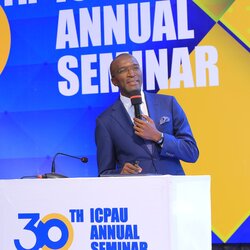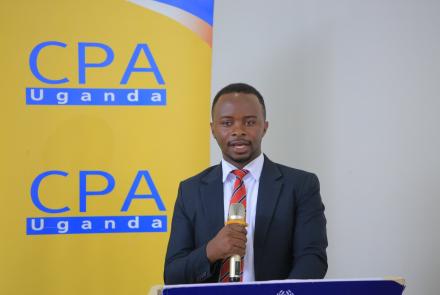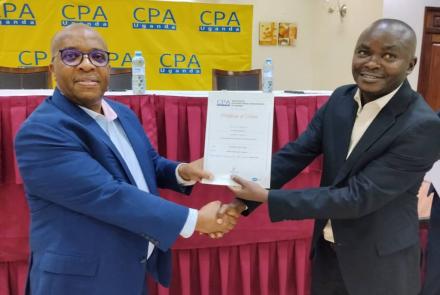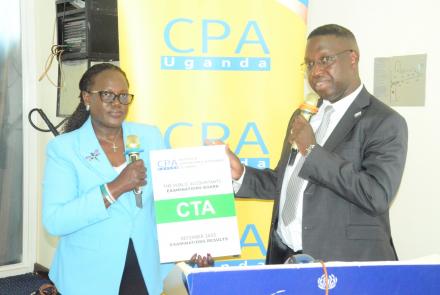By Abaasa Joan
Communications Officer, ICPAU
Alhaj Dr Kaddunabbi Ibrahim Lubega, Chief Executive Officer of the Insurance Regulatory Authority (IRA) has emphasised the critical role of personal insurance in building resilient families, reducing poverty shocks, and fostering social stability.
He was delivering an address on Personal Insurance and its Relevance to Social Cohesion at the 30th Annual Seminar of the Institute of Certified Public Accountants of Uganda (ICPAU).
Kaddunabbi reminded participants of the fundamental principle of insurance and risk-sharing. He explained that insurance is not just a financial product but a social safety net that spreads risks across communities.
“Insurance is, at its core, about solidarity. Everyone contributes small premiums so that the few who face misfortune are supported. This is the silent power of insurance,” he noted.
To illustrate the real-life impact of insurance, he painted a scenario of a young accountant in Kampala, married with two children. In one instance, the man dies unexpectedly in an accident without insurance, leaving his family vulnerable and dependent on relatives for survival. In another, he has a life insurance policy, and his family instantly receives UGX 50 million to cover education, rent, and other expenses.
“That is the dignity and security that personal insurance provides; it prevents grief from turning into poverty,” Kaddunabbi emphasised.
He pointed out that 43 per cent of Ugandans live below or just above the poverty line, meaning one illness, accident, or funeral could push households into destitution. With 38 per cent of healthcare expenses being out-of-pocket, families often sell assets or borrow to cover medical bills. Similarly, funeral expenses drain millions, forcing communities into constant fundraising efforts.
Kaddunabbi linked insurance directly to the concept of social cohesion, the bonds of trust, solidarity, and cooperation that keep societies stable. Insurance, he argued, reduces dependency on relatives, decreases resentment caused by frequent fundraising, and ensures that vulnerable groups remain productive.
“Insurance reflects the African spirit of Ubuntu—I am because we are. Instead of relying on strained family contributions, communities stand together through structured risk-sharing,” he said.
He also noted that insurance plays a vital role in intergenerational equity by protecting children’s education and shielding the elderly from becoming financial burdens. Through micro-insurance, low-income earners access the same safety nets as higher-income groups, narrowing inequalities and promoting inclusivity.
Despite these benefits, insurance penetration in Uganda remains low. Kaddunabbi cited several barriers, including limited financial literacy, cultural misconceptions, and affordability challenges.
Many Ugandans still view insurance as “planning for misfortune” or believe it is reserved for the wealthy. Others, influenced by cultural norms of extended family solidarity, rely on informal support rather than formal protection.
He also highlighted gaps in public policy, noting that tax incentives on premiums are limited and mandatory minimum insurance cover is absent in many sectors. Without stronger integration with national social protection systems like healthcare or pensions, insurance cannot fully drive cohesion.
Kaddunabbi urged accountants and other professionals to be champions of insurance awareness and adoption. He advised them to integrate insurance into financial planning for households, businesses, and organisations.
“As accountants, you are not just number-keepers. You are nation-builders. By mainstreaming personal insurance, you can ensure that no Ugandan household falls apart after a crisis,” he said.
He further encouraged accountants to use their influence in policy spaces to advocate for incentives such as tax relief on premiums and mandatory group health or life insurance in workplaces.
Additionally, he stressed the importance of holding insurers accountable through strong governance and transparent reporting to build public trust.
Kaddunabbi reiterated that personal insurance is not simply a financial tool but a bridge to social cohesion, as it empowers families to withstand crises, reduces inequalities, and strengthens the collective resilience of society.
The 30th ICPAU Annual seminar is happening between 3 – 5 September 2025 under the theme, Positioning Professionals for Sustainable Impact. The conference is organised by the Institute of Certified Public Accountants of Uganda (ICPAU) to provide an immersive learning experience for accountants, away from the hustle of everyday work.
The event is organised by ICPAU in partnership with Uganda Electricity Distribution Company Limited, Deposit Protection Fund, KPMG, Bank of Uganda, National Social Security Fund, National Identification and Registration Authority, PKF, Standard Chartered Bank, Uganda Communications Commission, NCBA Bank, Financial Intelligence Authority, Centenary Bank, Civil Aviation Authority, Uganda National Oil Company, Stanbic Bank, KCCA, Wazalendo SACCO and Wazalendo Investments, East Africa Development Bank, among other partners.




